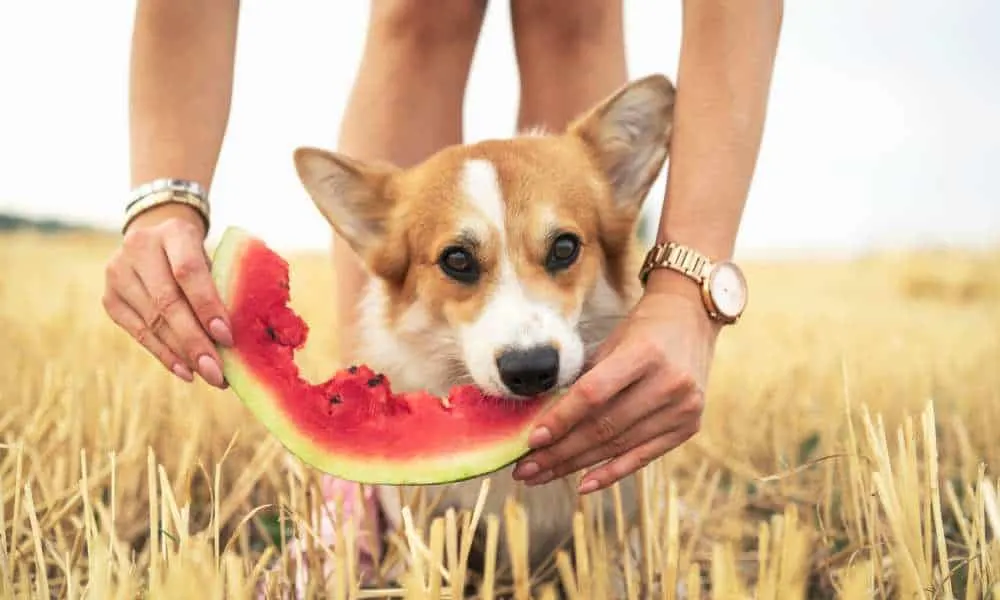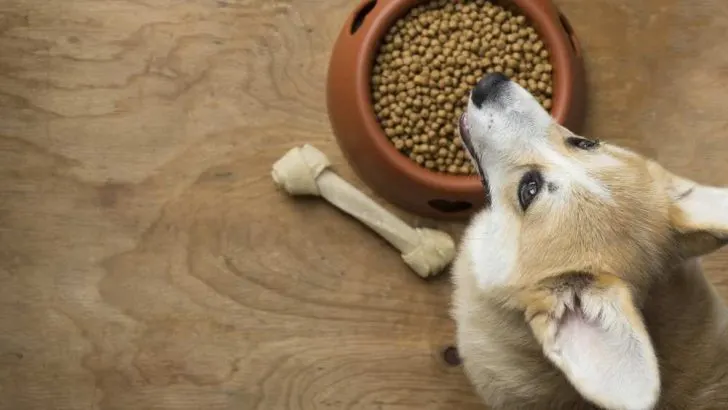Choosing the right food for your dog is essential. You have to pay attention to everything: your dog’s size and breed, the nutritional value, even some possible allergies your corgi might have.
Many people choose to ignore advice from their vets or owners of the same breed, and their dogs start to develop specific difficulties. For example, you are the owner of a corgi, and your dog starts to show signs of slight aggression – are corgis food aggressive?
If you are wondering whether your dog’s food is safe for eating and what factors you should consider before buying it, stay with us, and we will answer all your questions.
Stay tuned!

Corgi’s Food Aggression Signs?
There have been many instances where corgis have shown aggressive behavior when it comes to their food. Cases differ, but one thing stays the same – they are incredibly protective!
While some say that the problem lies in how the dog was fed when it was still a puppy, others blame the food content. To be honest, it can be both, though the second one is more common.
Many of those who choose to adopt a corgi, have to bear in mind that they were trained differently before coming to their new home. Your corgi’s previous owner might have spoiled them or haven’t treated them well at all – and this could pose a significant problem to you!
Your corgi may have become accustomed to an excessive amount of food every day (since they love eating so much), or they haven’t been given enough food at all, so they become incredibly protective over what they have in their bowl.
If this is the case, you should get a hold of a professional trainer and let them work with your corgi. This might cost you a bit more than you expected, but it is necessary to get rid of this terrible habit.
On the other hand, some claim that it is the ingredients in the food that causes such aggression in dogs.
Does dog food make your dog aggressive?
No!
The dog food you are buying is completely fine – it’s the processed food and leftovers you are feeding your dog that is the problem. Precisely speaking, sugars, carbohydrates, and additives are causing the problem and affecting your dog’s digestive system badly.
While regular dog food contains all the proteins needed, leftovers from human manufacturing is a very dangerous treat – you should definitely avoid it – especially because not every dog can digest such strong food.

Stop It In Time
Food aggression can be very dangerous to the entire household, and there are levels to it. It can be mild, moderate, and severe.
Mild aggression is seen in verbal signs – growling and raising teeth when approaching their food. Moderate aggression is seen in snapping or lunging when a person tries to approach the dog. Lastly, and most dangerously – severe aggression can lead to a dog chasing and biting its owner.
If you are struggling with this, and can’t seem to find the right solution, look no further.
Here are six steps in which you can prevent your corgi’s food aggression.
- Be present when your dog is eating – this doesn’t mean that you should be right next to your dog by trying to step back a few feet when you pour the food in their bowl and see how they react to it.
- Add a tasty treat and step back – if they have been behaving well, you can always throw in a delicious snack next to the regular food bowl and step back. This will undoubtedly create a sense of achievement in them, and they will hopefully continue to behave well.
- Stand close, pet, and talk to your dog – your dog mustn’t see you as a threat when eating. That’s why you should try to stand close, but not too close. If they don’t start growling or raising their teeth at you, pet them and try to communicate. If this shows to be successful, simply stand up and walk away.
- Try to hand feed your dog – this is a sign of huge trust, and it can be extremely dangerous as well. You should approach this only if you are sure that your dog won’t show severe aggression signs. Approach your dog in a friendly manner and with some food in your hand. Instead of placing it in the bowl, try hand feeding your dog – if there is no loud bark or growl, you are safe to continue.
- Touch the bowl, but not the food – if the dog became accustomed to you being close, try to touch their bowl by either adding some tasty treat or just adjusting their bowl. But don’t be too pushy. Learn to back off when your dog is in the middle of the meal.
- Repeat this with other family members – once the dog’s original owner went through all these steps without any complications, it would be best for other family members to do the same – step by step, of course. This will contribute to a safe environment for both your dog and you.
TIP: Sometimes, problems occur because there are no separate bowls for your dogs – pay attention to this.
Learn More: How To Stop Aggression In Corgis?

Corgi Temperament
There are many factors to a dog’s personality and temperament. When you take a look at corgi dogs – do you regard them as being aggressive? Probably not. This can change over time, which is why it is very important to be familiar with your dog’s behavioral pattern from an early start.
So, let’s begin.
The most common description for a corgi would be playful and happy. They are very energetic and love to run around all day. Apart from their bubbly nature, they are very loyal to their owner and intelligent. But, in order to achieve this, you must start training them from an early age.
Of course, all of this differs according to breed, and these “big dogs in small bodies” have a lot to show us.
Since they like to play a lot and spend time with their owner, they might become a little needy. However, they are not difficult – they can quickly adapt to any situation and environment you put them in.
Independence is something questionable with this breed. Sometimes, you might get the feeling that your corgi is not listening to a word you say and that he is ignoring every command you give. From this, you can see how big of an influence young training can have on a corgi dog.
Corgis are a little stubborn also. When it comes to specific situations, they like to do as they please. Allowing your dog freedom is essential, but you should know where to draw the line – show them who the boss is. This will work for both of you.
Some owners have claimed that their corgis turned territorial over time. They don’t hesitate to make a fuss at the park and bark at other dogs or people. Don’t be fooled by their small size – this is very likely to happen. Corgis have a very loud bark that can sometimes be terrifying, even to family members.
Suppose you try to silence them – good luck. This is something which will not go away easily. So, if you plan on owning a corgi, get used to the constant bark. At some point, it will become a usual thing.
The important thing is that they are not dangerous dogs, and they should be marked as dogs who have a bad temper. They are just dogs who need a bit more training than other breeds, nothing more.
If you are interested in one particular characteristic which distinguishes the Pembroke corgis from the Welsh Cardigan corgis is that the Pembroke is more social. The Welsh Corgis are known to be more reserved and shy.

4 Factors To Consider When Choosing Corgi Food
Like we mentioned before, you should be very careful when you are choosing dog food.
Actually, you should consider the following four factors:
- Breed
- Size
- Allergies
- Personal preferences
When it comes to the dog’s breed, you should pay attention to whether your dog is an active type – in that case, he will need some strong nutrients. If he is a calmer type – don’t go overboard with food.
Size is also an essential factor. Logically, bigger dogs will need more and stronger food. Smaller dogs will need less food and something not so strong so that they don’t put on too much weight.
As a responsible owner, pay extra attention to all allergies and sensitivities your dog might have. This should be determined in the early stages by visiting the doctor and taking the necessary steps. If your corgi’s skin and coat are healthy-looking, you are doing a good job.
However, if you neglect this factor – it could be detrimental to your dog’s health. He could develop all kinds of health issues – anaphylactic shock, for example.
Also, your corgi might like one type of food more than the other. See what he enjoys eating, and if he finds a certain type of food more satisfying than the other – listen to him.
Here are some extra tips concerning feeding your corgi:
- Always wash your hands before serving his food.
- Store the dog food separately from human food.
- Always use a clean scoop for the bowl.
- Pay attention to storage instructions so that the food doesn’t go bad.
- Don’t let your corgi lick your face after eating.
- If you have a younger child, don’t let them near pet food.
- Never feed wild rodents to your pet.
See Also: Are Corgis Hypoallergenic? Do Corgis Cause Allergies?

Corgi Food Recommendations
Corgi food can be divided according to your dog’s age. There are different food brands for the puppy, adult, and senior corgis, and we are here to list them down for you:
Corgi Puppies
| IAMS™ – dry dog food | Merrick – grain-free real chicken and sweet potato |
| Nature’s Recipe – fresh dog food | CANIDAE – freeze-dried petite salmon formula |
Corgi Adults
| Hill’s – chicken recipe | Nutro – farm-raised chicken |
| Blue Buffalo – grain-free formula | Evolve – dry dog food |
Corgi Seniors
| Nutro – farm-raised chicken and brown rice | Blue Buffalo – dry dog food |
| Chicken Soup for the Soul – mature chicken | Royal Canin – indoor small breed dry food |
Feeding a corgi puppy is the most delicate among these three, and here is where you should pay the most attention. It is most important that they get their needed calcium, phosphorus, magnesium, and vitamin A.
Corgi’s daily meals should be evenly spread throughout the day.
- 2 – 4 months: 4 meals
- 4 – 6 months: 3 meals
- 6 – 8 months: 2-3 meals
- 8 months and older: 1-2 meals a day
Don’t worry as the number of meals decreases. Although chubby corgis are cute, this might not be such a healthy option for your pup.

Can Dog Food Go Bad?
Like any other food, your corgi’s food has an expiration date, and it’s up to you to keep track of it. But how do you do it?
Here are a couple of tips you should know.
Firstly, what causes food to get spoiled?
Numerous factors influence this, but these are the most common.
- Exposure to air – bacteria appearing
- Exposure to moisture – causes mold.
- Exposure to high temperatures – leading to rancidity
Regular dog food can last between 12-18 months – if appropriately kept. In order for it to last this long, you should keep it in your pantry, in the dark, sealed, and at room temperature.
Now, the red flags that show your dog’s food have expired:
- You notice sour or odor in the smell.
- You notice mold, moisture, or bugs when you open the bag.
- The dog food has passed the expiration date.
- Your dog’s food has been exposed to heat or humidity for too long.
Your dog can also notice when something is wrong with his food. He will show signs of dislike or discomfort during and after eating.
Read More:

Conclusion
Corgis are great dogs. They’re known for their intelligence and loyalty.
They’re not low maintenance dogs, so if you’re not spending enough time with them, you could run into some problems.
You shouldn’t worry too much if your corgi occasionally shows some level of aggression, it’s in their nature.
However, if they’re often too aggressive it’s on the owner to react. It could be due to the number of reasons we mentioned today.
The best advice we have is to give your corgi a good life and a decent amount of attention. Everything else should take care of itself.

